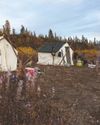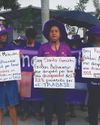Prøve GULL - Gratis
Saving Akikodjiwan
Briarpatch
|March/April 2019
Developers are building condos on top of sacred Algonquin Anishinabeg islands. Why are Indigenous sacred sites not given the same legal protections as settler ones?

On January 8, 2015, the Ontario Provincial Police (OPP) held a meeting in Ottawa. They invited the Royal Canadian Mounted Police (RCMP), Ottawa police, Gatineau police, representatives from a pulp, paper, and personal care company called Domtar, and a construction company called Windmill Developments.
At the time, Windmill and other developers were planning to build Zibi – “a world-class sustainable waterfront community” of condominiums, stores, and offices – on Akikodjiwan, a sacred Algonquin Anishinabeg site in downtown Ottawa and Gatineau, after demolishing the old Domtar building on the site. Meanwhile, anti-colonial activists were ramping up their opposition to the Zibi development. And – as the meeting between four police forces and the industry representatives indicates – the cops were also preparing for the resistance.
The sacred site, Akikodjiwan, includes Chaudière Falls and the Chaudière, Albert, Amelia, Victoria, Wright, and Coffin islands. (Coffin Island is now submerged, and Wright Island is considered part of the Gatineau shoreline.) These islands sit in the middle of the Kitchi Zibi (Ottawa River), between the cities of Ottawa and Gatineau.
Dream Unlimited Corporation and Theia Partners (an offshoot of Windmill Developments) – the settler developers – stand to make hundreds of millions by building condominiums on Akikodjiwan. Construction on Albert and Chaudière islands has already begun.
In 2016, the Kitigan Zibi band council filed a land claim that included the Chaudière, Albert, and Victoria islands in the Ottawa River, and there are ongoing discussions about the area between the government and representatives from the Algonquin tribal councils. A group called the Traditional Grandmothers of the Pikwakanagan has also filed a legal case in Ontario’s Superior Court of Justice asserting Indigenous title to the islands.
Denne historien er fra March/April 2019-utgaven av Briarpatch.
Abonner på Magzter GOLD for å få tilgang til tusenvis av kuraterte premiumhistorier og over 9000 magasiner og aviser.
Allerede abonnent? Logg på
FLERE HISTORIER FRA Briarpatch

Briarpatch
PLATFORMS FOR PEOPLE, NOT PROFIT
Digital platforms boast that they’ve “democratized” cultural production. But what would truly democratic platforms look like in Canada?
10 mins
January/February 2020

Briarpatch
ORGANIZING THROUGH LOSS IN THE HEART OF OIL COUNTRY
The story of climate justice organizing in Alberta, at the heart of the tarsands, is the story of a group of young activists learning what it means to lose, and keep on fighting
13 mins
January/February 2020

Briarpatch
GROWING THE LABOUR MOVEMENT
How unions are using community gardens to engage members, nourish communities, and help strikers weather the picket line
11 mins
January/February 2020

Briarpatch
A NEW ERA FOR OLD CROW
In the Yukon’s northernmost community, the Vuntut Gwitchin First Nation is reckoning with how to preserve their land and culture, amid a warming climate and an influx of tourists
16 mins
January/February 2020

Briarpatch
“At Least Hookers Get Wages”
The risky business of sex work in the gig economy
14 mins
November/December 2019

Briarpatch
The Literal – And Literary – Futures We Build
Briarpatch editor Saima Desai talks to two judges of our Writing in the Margins contest about Idle No More and MMIWG, ethical kinship, writing queer sex, and their forthcoming work.
9 mins
November/December 2019

Briarpatch
The Cost Of A T-Shirt
In Honduras, women maquila workers are fighting back against the multinational garment companies that they say are endangering their health and safety.
18 mins
November/December 2019

Briarpatch
Milking Prison Labour
Canada’s prison farms are being reopened. But when prisoners will be paid pennies a day, and the fruits of their labour will likely be exported for profit, there’s little to celebrate.
12 mins
November/December 2019

Briarpatch
Bringing Back The Beat
In mainstream media, labour journalism has been replaced by financial reporting and business sections. But journalism students are raising the labour beat from the grave.
10 mins
November/December 2019

Briarpatch
There's No Journalism On A Dead Planet
Corporate media owners are killing local newspapers – which is making it impossible for everyday people to understand the on-the-ground impacts of the climate crisis
18 mins
September/October 2019
Translate
Change font size

